
Cloning is the process of producing individual organisms with identical genomes, either by natural or artificial means. In nature, some organisms produce clones through asexual reproduction; this reproduction of an organism by itself without a mate is known as parthenogenesis. In the field of biotechnology, cloning is the process of creating cloned organisms of cells and of DNA fragments.
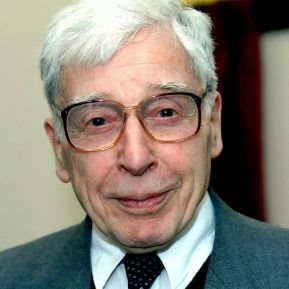
Sir Robert Geoffrey Edwards was a British physiologist and pioneer in reproductive medicine, and in-vitro fertilisation (IVF) in particular. Along with obstetrician and gynaecologist Patrick Steptoe and nurse Jean Purdy, Edwards successfully pioneered conception through IVF, which led to the birth of Louise Brown on 25 July 1978. They founded the first IVF programme for infertile patients and trained other scientists in their techniques. Edwards was the founding editor-in-chief of Human Reproduction in 1986. In 2010, he was awarded the Nobel Prize in Physiology or Medicine "for the development of in vitro fertilization".

Captive breeding, also known as captive propagation, is the process of keeping plants or animals in controlled environments, such as wildlife reserves, zoos, botanic gardens, and other conservation facilities. It is sometimes employed to help species that are being threatened by the effects of human activities such as climate change, habitat loss, fragmentation, overhunting or fishing, pollution, predation, disease, and parasitism.
Interferon tau is a Type I interferon made of a single chain of amino acids. IFN-τ was first discovered in ruminants as the signal for the maternal recognition of pregnancy and originally named ovine trophoblast protein-1 (oTP-1). It has many physiological functions in the mammalian uterus, and also has anti-inflammatory effect that aids in the protection of the semi-allogeneic conceptus trophectoderm from the maternal immune system.

Motilal Madan is an Indian biotechnology researcher, veterinarian, academic and administrator. In a career spanning over 35 years, Madan published 432 research articles and policy papers in international and national reference journals—including 226 original research papers—and pioneered research in reproductive endocrinology, embryo biotechnology, In vitro fertilisation, and cloning.
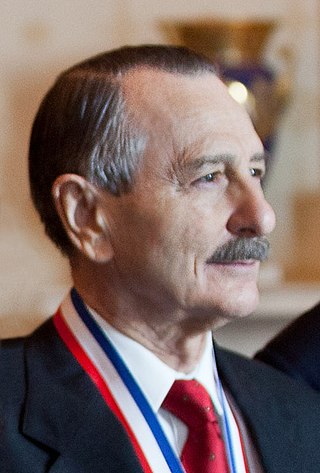
Ralph Lawrence Brinster is an American geneticist, National Medal of Science laureate, and Richard King Mellon Professor of Reproductive Physiology at the School of Veterinary Medicine, University of Pennsylvania.
Neal Lloyd First was an American biologist.
Fuller W. Bazer is an American animal scientist and a Regents Fellow, Distinguished Professor, and O.D. Butler Chair in Animal Science at Texas A&M University.
Robert H. Burris was a professor in the Biochemistry Department at the University of Wisconsin-Madison. He was elected to the National Academy of Sciences in 1961. Research in Burris's lab focused on enzyme reaction mechanisms, and he made significant contributions to our knowledge of nitrogen fixation.
Marilyn Bernice Renfree is an Australian zoologist. She completed her PhD at the Australian National University, was a post-doctoral fellow in Tennessee and then Edinburgh before returning to Australia. Since 1991, Renfree has been Professor of Zoology at the University of Melbourne. Her main research interest focuses on reproductive and developmental biology of marsupials.
Margaret Sabine (1928–2011) was the pioneering virologist for Australian veterinary schools. She conducted studies on viruses in cats and horses, with her characterisation of different equine viruses being her most significant scientific contribution. Other achievements include becoming head of the department of veterinary pathology and bacteriology, being chairwoman of the NSW Animal Welfare Advisory Council, an honorary Veterinary Science degree at the University of Sydney, and being a co-discoverer of viral interference.
Om Praksh Bahl (1927–2004) was an Indian-American molecular biologist, academic and a Distinguished Professor of the State University of New York. He was known for his studies on Human chorionic gonadotropin, popularly known as the pregnancy hormone. He was associated with the World Health Organization as an adviser to their Population Council and was a member of the Population Research Committee of the National Institutes of Health. The Government of India awarded him the third highest civilian honour of the Padma Bhushan, in 1973, for his contributions to science and engineering.
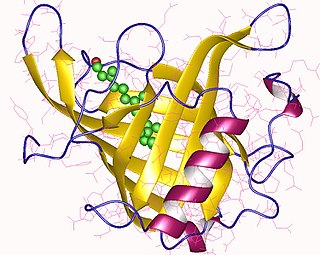
Retinol-binding proteins (RBP) are a family of proteins with diverse functions. They are carrier proteins that bind retinol. Assessment of retinol-binding protein is used to determine visceral protein mass in health-related nutritional studies.
Nuggehalli Raghuveer Moudgal was an Indian reproductive biologist, endocrinologist and the chairman of the Department of Biochemistry and dean of Faculty of Science at the Indian Institute of Science. He was known for his pioneering researches on gonadotropin and was an elected fellow of the Indian Academy of Sciences and the Indian National Science Academy. He was an associate of noted scientists, Choh Hao Li and Rodney Robert Porter and discovered the role of hormones in generating immune response in living beings, during his association with the former. The Council of Scientific and Industrial Research, the apex agency of the Government of India for scientific research, awarded him the Shanti Swarup Bhatnagar Prize for Science and Technology, one of the highest Indian science awards for his contributions to Medical Sciences in 1976.
Robert John Aitken is a British reproductive biologist, widely known for identifying oxidative stress as a significant contribution to infertility and its actions on human sperm function. He also made substantial contributions to clinical practice translation in male reproductive health, notably the development of new contraceptive vaccine.
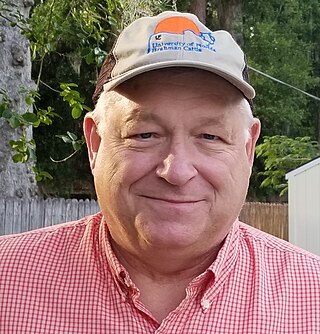
Peter J. Hansen is an American animal scientist and physiologist who serves as distinguished professor and L.E. "Red" Professor of Animal Sciences in the Department of Animal Sciences at University of Florida

Maternal recognition of pregnancy is a crucial aspect of carrying a pregnancy to full term. Without maternal recognition to maintain pregnancy, the initial messengers which stop luteolysis and promote foetal implantation, growth and uterine development finish with nothing to replace them and the pregnancy is lost.
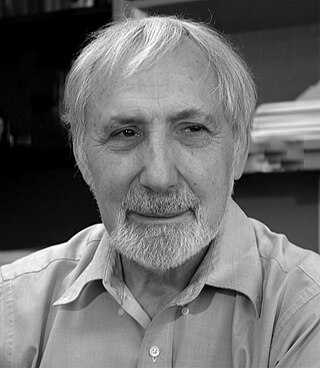
George Stark is an American chemist and biochemist. His research interests include protein and enzyme function and modification, interferons and cytokines, signal transduction, and gene expression.

Barbara Jean Francis Apgar is an American biochemist. She worked on important research on ribonucleic acids (RNA), and on zinc deficiency as a risk factor in reproduction. She won the Federal Woman's Award in 1970, and the Arthur S. Flemming Award in 1973.
The Society for the Study of Reproduction (SSR) is an international not-for-profit professional society for scientists working in the fields of reproduction, fertility and development. The Society focuses on reproduction in both people and animals, including research from the areas of medicine, agriculture and basic biology. It is credited with being the first organization to focus on "the full panoply of reproductive phenomena" and is listed as a major professional association publishing reproductive research and a major organization in American animal agriculture. The Society includes members from at least 50 countries worldwide. The official peer-reviewed scientific journal for SSR is Biology of Reproduction.









